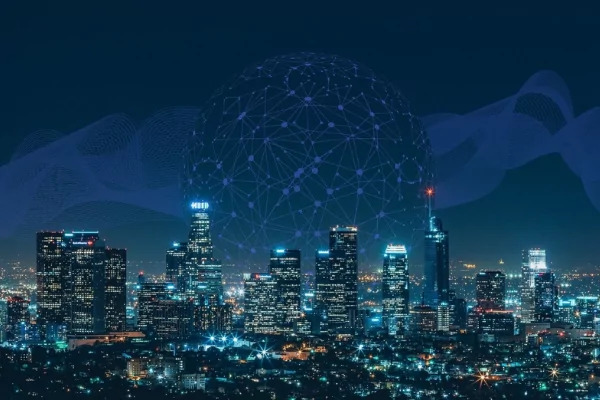
Smart Cities: Utilizing Technology for Urban Development
In the 21st century, urbanization has reached an unprecedented scale. Already more than half of the world’s population lives in cities, and since the cities are continuously growing and changing, a new approach to the word development was created. The smart city is a developed urban area that creates sustainable development using multiple types of modern technology. The present paper investigates the subject of technology usage while developing, how the smart city utilizes technology and the future of urban areas with the contribution of the largest real estate companies.
1. What are Smart Cities?
Smart cities are urban areas that utilize digitally innovative technologies and data to address significant issues and enhance a wide range of urban dimensions of life. Smart cities are developed in multiple sectors – transportation, energy, health, safety, and administration – to improve levels of efficiency, sustainability, and people’s well-being.
2. Key Technologies Driving Smart Cities
The development of smart cities relies on several technologies, without which the same would remain a mere concept. These include:
– Internet of Things (IoT): IoT sensors and devices offer real-time information from multiple sources, helping city officials to monitor and address the condition of their infrastructure, increase resource consumption effectiveness, and enhance service provision.
– Big Data Analytics: It is used for analyzing large data to facilitate data-driven smart decisions and predictive planning. It could be utilized in traffic and waste management and public health to find innovative solutions.
– Artificial Intelligence (AI) and Machine Learning: Incentivizes automating various processes, operations, and services in smart cities. Moreover, machine learning is used to support predictive service, maintenance, city traffic, and citizens to provide highly personalized services.
– Renewable Energy and Sustainable Infrastructure: Moreover, smart cities are environmentally friendly, using renewable energy solutions, green buildings, and infrastructure with low carbon emissions that minimize environmental destruction and build resistance against climate change.
3. Applications of Smart City Technologies
Several applications are incorporating smart city technologies to solve urban problems and improve urban life.
– Smart Transportation: Smart transportation which is enabled through intelligent transportation systems leveraging data analytics and real-time monitoring to navigate traffic flow reducing jams and enhancing access to public transit among other sustainable mobility prospects.
– Smart Energy Management: Smart cities also promote efficient energy management systems such as smart grids that help reduce energy consumption and better integrate renewable sources for more efficient and resilient energy networks.
– Smart Healthcare: Proactive healthcare delivery through telemedicine, remote monitoring, and health analytics technologies will lead to better patient care and outcomes and enhanced access to healthcare facilities. In smart cities, “everyone will have personalized and continuous healthcare from wherever they are” by 2030
– Smart Public Safety: Smart safety comprises CCTV cameras, sensors, predictive analytics, and AI-infused surveillance drones. They prevent, detect, and respond to crime, emergencies, and natural disasters with greater precision.
4. The Role of Best Real Estate Companies in Smart City Development
– Urban Planning and Development: The top real estate companies also engage with city planners and government agencies to plan and build smart infrastructure. Their projects include smart buildings, mixed-use developments, and smart, multi-purpose sustainable living spaces. They also install tech in their developments:
– Integration of Smart Technologies: High-performing real estate developers integrate various smart technologies into their projects including energy-efficient building systems, smart home automation, and connectivity infrastructure to improve the life quality of the inhabitants.
– Sustainable Development Practices: The best real estate companies ensure the sustainability of their projects by complying with green building standards, utilizing renewable energy solutions, and setting eco-friendly design principles that help achieve the general sustainability goals of a smart city.
– Community Engagement and Empowerment: on the one hand, real estate developers work with communities, getting to know their wishes and creating a sense of community and collaboration; on the other hand, all the input can be implemented in the arguably better design and implementation of smart city projects that can develop on such territories and fulfill more diversified needs.
5. Future Outlook for Smart Cities
With the constant development of technologies and the rapid growth of urban territories, the very idea of smart cities will be in great demand around the globe. In this vision, the best real estate companies are the agents that will actively promote the smart cities concept. Using investments and technologies, to promote sustainability and community involvement, these companies will design and implement healthier living opportunities in cities.
In conclusion, the information listed above is worth noting that smart cities are the next step in the development of cities. Smart cities use technology to deal with typical urban symptoms, and the goal is to improve the quality of life of its citizens. Real estate companies can help to create future cities that will be smart, sustainable, and beneficial. One day it will be the most perfect place for people to live and work for more generations.
Read Dive is a leading technology blog focusing on different domains like Blockchain, AI, Chatbot, Fintech, Health Tech, Software Development and Testing. For guest blogging, please feel free to contact at readdive@gmail.com.
